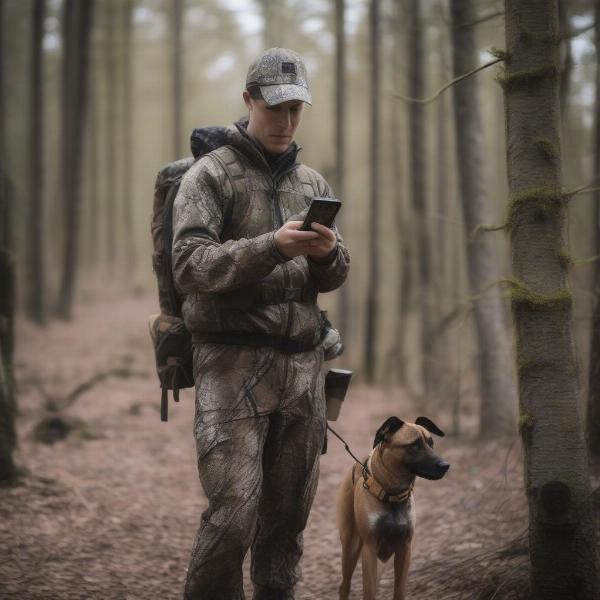Tracking dog collars are essential tools for hunters who use dogs. They provide peace of mind, knowing your dog’s location and safety are ensured, especially in challenging terrains. Choosing the right tracking dog collar for hunting involves considering various factors like range, battery life, GPS accuracy, and training features. This guide explores these aspects to help you make an informed decision for your hunting companion.
Understanding Tracking Dog Collar Technology
Tracking dog collars primarily use GPS (Global Positioning System) technology to pinpoint your dog’s location. These collars transmit location data to a handheld receiver or a smartphone app, allowing you to monitor your dog’s movements in real-time. Some advanced collars also incorporate GLONASS and Galileo for enhanced accuracy and global coverage, even in dense forests. Understanding the different technologies available is crucial for selecting the best collar for your specific hunting needs.
Key Features to Consider
Choosing a tracking dog collar requires carefully evaluating several key features. Range, crucial for wide-ranging hunts, dictates how far the collar can transmit signals to your receiver. Battery life is equally important, especially on multi-day hunts. A long-lasting battery ensures continuous tracking without interruptions. GPS accuracy ensures precise location tracking, minimizing search time and maximizing hunting efficiency. Some collars also offer training features like tone, vibration, and stimulation, adding another layer of control during hunts.
![]() Hunter using handheld device with tracking dog collar
Hunter using handheld device with tracking dog collar
Range and Signal Reliability
Tracking collars come with varying ranges, from a few miles to dozens of miles. Consider your typical hunting terrain and choose a collar with a range that exceeds your expected needs. Signal reliability is also vital, ensuring consistent tracking even in challenging environments like dense forests or mountainous regions. Look for collars with strong antennas and reliable signal processing capabilities.
Battery Life and Charging Options
Battery life is a critical factor, especially on extended hunting trips. Collars with longer battery life minimize the need for frequent charging. Consider collars with replaceable batteries or fast-charging capabilities for added convenience. Some collars offer power-saving modes to extend battery life when needed.
GPS Accuracy and Update Frequency
Accurate GPS tracking is paramount for quickly locating your dog. Look for collars with high GPS sensitivity and fast update frequencies, providing real-time location updates. Some collars utilize multiple satellite systems for enhanced accuracy in challenging terrains.
Training Features and Stimulation Levels
Some tracking collars incorporate training features like tone, vibration, and stimulation. These features can be useful for reinforcing commands and controlling your dog’s behavior during the hunt. Look for collars with adjustable stimulation levels to customize the training experience based on your dog’s temperament and training needs.
Choosing the Right Collar for Your Hunting Dog
Selecting the appropriate tracking dog collar depends on your specific hunting needs, dog breed, and budget. Consider factors like the terrain you typically hunt in, the size and breed of your dog, and the desired features. A hunting dog radio collar can be a useful tool for communication and control in certain hunting scenarios. For hunters who venture into varied terrains and require longer range tracking, a gps dog collar or garmin dog collars might be the best choice.
Conclusion
Investing in a high-quality tracking dog collar is a wise decision for any hunter who relies on their canine companion. By carefully considering the factors discussed in this guide, you can choose the perfect tracking dog collar for your hunting needs, ensuring both your dog’s safety and a successful hunt. Remember to prioritize features like range, battery life, GPS accuracy, and training capabilities to find the best fit for you and your hunting partner.
FAQ
- What is the typical range of a tracking dog collar for hunting? The range varies greatly, from a few miles to dozens of miles, depending on the model and terrain.
- How long does the battery of a tracking dog collar typically last? Battery life depends on usage and settings but can range from a few hours to several days.
- Are tracking dog collars waterproof? Most tracking dog collars designed for hunting are waterproof or water-resistant.
- Can I use a tracking dog collar for training purposes as well? Some tracking collars offer training features like tone, vibration, and stimulation.
- What is the difference between GPS and radio tracking collars? GPS collars use satellite signals for location tracking, while radio collars use radio waves for communication and shorter-range tracking.
- How much do tracking dog collars typically cost? Prices vary based on features and brand, ranging from a few hundred dollars to over a thousand dollars.
- Are there any legal restrictions on using tracking dog collars for hunting? Regulations vary by location, so it’s crucial to check local hunting laws regarding the use of tracking collars.
Related Articles
About ILM Dog
ILM Dog is your trusted international resource for all things dog-related. We provide expert advice and practical information on dog breeds, health, training, nutrition, grooming, and much more. Whether you’re a seasoned dog owner or just starting your journey with a furry friend, ILM Dog offers valuable insights and recommendations for every stage of your dog’s life. For further assistance and personalized advice, contact us at [email protected] or call us at +44 20-3965-8624. We’re here to help you provide the best possible care for your beloved companion.
